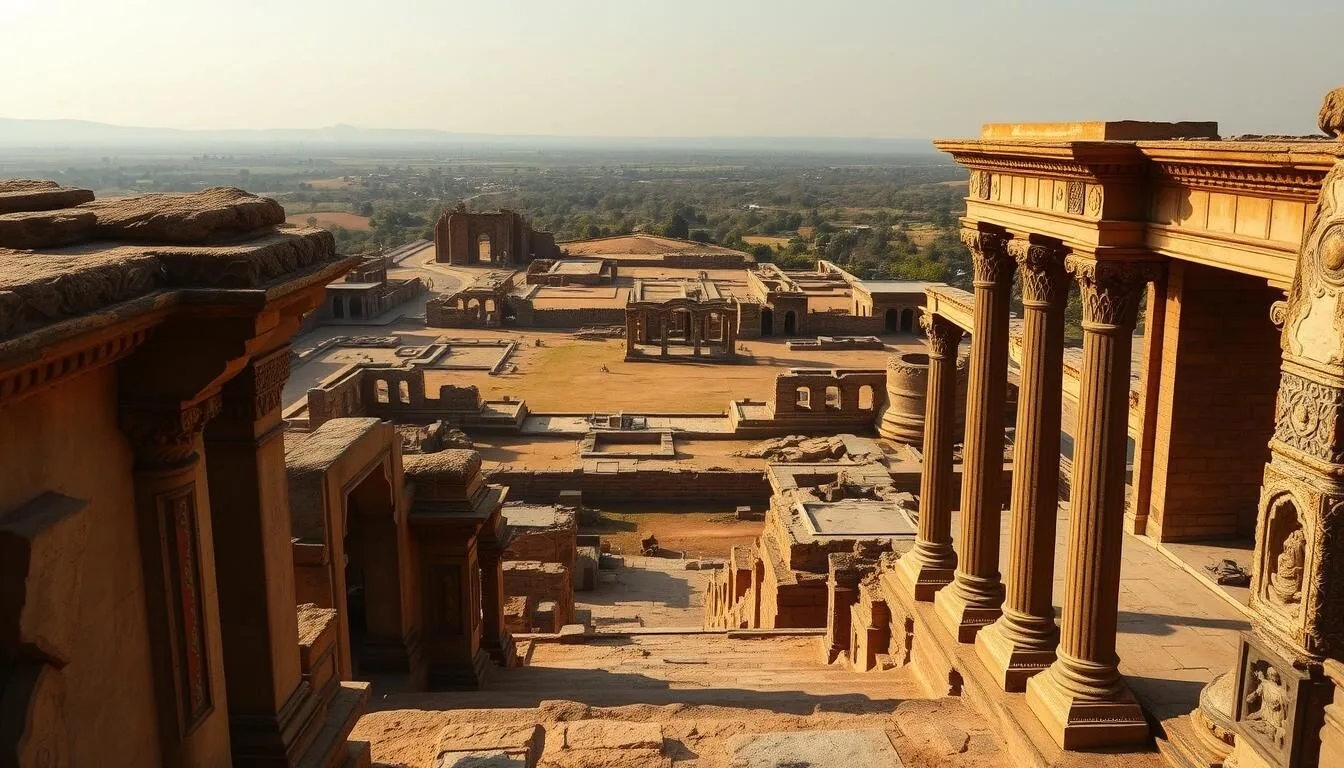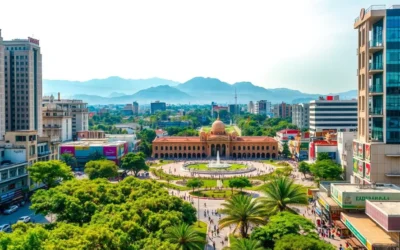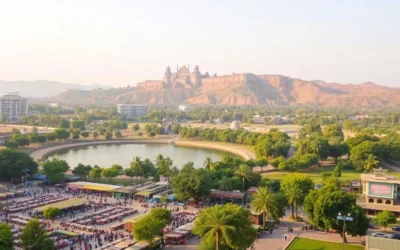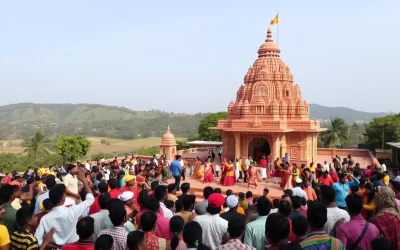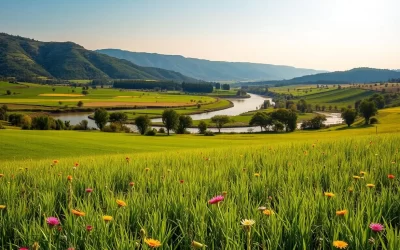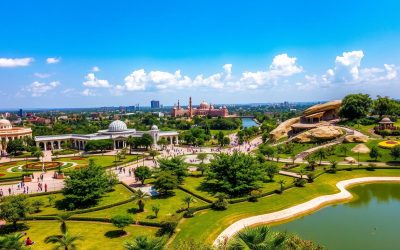✓ Accommodations✓ Flights✓ Rental Cars
You might be surprised to know that a city in northern India has been a silent witness to some of the most pivotal battles in Indian history. Panipat, a city steeped in history, is a treasure trove of cultural heritage and industrial significance.
Known as the “City of Weavers,” Panipat beautifully blends its old traditions with modern industry. As you explore this vibrant city, you’ll discover a unique blend of ancient monuments, bustling markets, and historical sites that tell the story of India’s past.
From the battlefields that shaped Indian history to the temples and dargahs that attract devotees, there’s something for everyone in Panipat. Get ready to uncover the top attractions that make this city a must-visit destination.
Discovering the Historical City of Panipat
As you step into Panipat, you’re about to uncover the layers of its rich history. This city, with its ancient origins, is a significant place in Indian history.
A Brief History of Panipat
Panipat’s history dates back to the epic Mahabharata, where it is mentioned as one of the five cities founded by the Pandavas. The city has been a witness to three pivotal battles that shaped the course of Indian history. The history of Panipat is a testament to its importance in the region.
![]()
How to Reach Panipat
Reaching Panipat is convenient, with multiple transportation options available. You can fly into nearby airports in Delhi or Uttar Pradesh, take a train directly to Panipat Railway Station, or travel by road from neighboring cities like Delhi, Ambala, and Karnal.
| Mode of Transport | Nearest Facility | Connecting Cities |
|---|---|---|
| Air | Delhi Airport | International and Domestic |
| Train | Panipat Railway Station | Major Indian Cities |
| Road | Panipat Bus Stand | Delhi, Ambala, Karnal |
Planning your visit during the cooler months (October to March) ensures a pleasant experience while exploring Panipat’s historical sites.
Explore the Famous Battlefields of Panipat
Step into the historic battlefields of Panipat, where the echoes of three crucial battles continue to resonate through the annals of time. These battlefields are a testament to the city’s rich history, having played a pivotal role in shaping the course of Indian history. As you explore these sites, you’ll uncover the stories behind the battles that forged the destiny of a nation.
First Battle of Panipat Memorial
The First Battle of Panipat Memorial marks the site where Babur defeated Ibrahim Lodhi in 1526, establishing Mughal rule in India. This pivotal moment changed the subcontinent’s history forever, paving the way for the Mughal Empire’s expansion.
Second Battle of Panipat Site
The Second Battle of Panipat Site is marked by commemorative plaques that tell the story of Akbar’s forces defeating Hemu in 1556, consolidating Mughal power in northern India. This battle strengthened the Mughal Empire’s grip on the region.
Third Battle of Panipat Site and Kala Amb
The Third Battle of Panipat Site witnessed a fierce fight between the Marathas and Ahmad Shah Abdali’s Afghan forces in 1761. The nearby Kala Amb (“Black Mango”) is a legendary site named after a mango tree that supposedly bore black fruit due to the blood-soaked soil. These sites offer a glimpse into the intense conflicts that shaped the region’s history.
As you visit these battlefields, you’ll gain a deeper understanding of how these three major battles fought on Panipat’s soil shaped the course of Indian history. The informative plaques, memorials, and peaceful parks that now occupy these once-violent grounds provide a somber reflection on the past.
Visit Historical Monuments and Architectural Marvels

As you explore Panipat, you’ll discover a treasure trove of historical monuments that are a testament to the city’s significance. The city is home to numerous architectural marvels that have withstood the test of time, offering a glimpse into its storied history.
Ibrahim Lodhi’s Tomb
Ibrahim Lodhi’s Tomb is a must-see spot in Panipat, steeped in history and offering a glimpse into the city’s past. It’s the final resting place of Ibrahim Lodhi, the last Sultan of the Lodhi dynasty who was defeated by Babur in the First Battle of Panipat.
The tomb itself is simple yet powerful, located in a peaceful park that invites quiet contemplation. You can explore the architectural details of the tomb, which features a simple yet elegant structure reflecting early Mughal architectural elements.
Kabuli Bagh Mosque
The Kabuli Bagh Mosque is another significant historical monument in Panipat, built by Emperor Babur after his victory in the First Battle of Panipat. The mosque is named after his wife, Kabuli Begum, and is a beautiful example of early Mughal architecture.
You can admire the intricate carvings and Persian inscriptions at the mosque, and explore its serene garden and ancient baoli (stepwell) that add to the historical ambiance of the complex.
Salar Gunj Gate
Salar Gunj Gate is a historical gate that was once a vital part of Panipat’s defenses. Now, it’s a symbol of the city’s architectural heritage and a favorite spot for photographers seeking to capture the essence of historical Panipat.
You can learn about the historical significance of the gate through informational plaques and boards that provide context about its construction and importance in Indian history.
Explore Religious Sites and Spiritual Destinations

As you explore Panipat, you’ll discover a blend of religious sites that reflect its cultural diversity. The city is home to numerous sacred destinations that attract devotees from various faiths, showcasing its inclusive cultural fabric.
Bu Ali Shah Qalandar Dargah
The Bu Ali Shah Qalandar Dargah is a revered Sufi shrine dedicated to the 13th-century saint Bu Ali Shah Qalandar. This spiritual oasis welcomes devotees from all walks of life, offering a calming atmosphere that feels spiritual and welcoming.
The dargah’s intricate marble work and detailed Islamic calligraphy are a testament to the artistic excellence of its time. Visitors can experience the annual Urs festival, a major event that attracts thousands of pilgrims and features qawwali performances, spiritual discourses, and communal prayers.
Devi Temple
The ancient Devi Temple is dedicated to Goddess Durga, featuring traditional architecture, detailed carvings, and a sacred pond that creates a serene atmosphere for worship and reflection. During Navratri, the temple comes alive with elaborate decorations, rituals, and a steady stream of devotees seeking the goddess’s blessings.
The temple’s vibrant celebrations during Navratri are a sight to behold, with devotees gathering to seek the goddess’s blessings.
Jain Mandir
The Jain Mandir is dedicated to Lord Mahavira, featuring beautiful carved designs and a peaceful garden area that provides a tranquil space for spiritual contemplation. This sacred site reflects Panipat’s rich cultural heritage and its ability to harmoniously coexist with different faiths.
These diverse religious sites not only showcase Panipat’s spiritual landscape but also contribute to the city’s cultural fabric, making it a unique destination for travelers seeking a blend of spirituality and cultural experiences.
Panipat, Haryana: Best Things to Do for History Enthusiasts
If you’re a history buff, Panipat is a must-visit destination that promises to enrich your understanding of Indian history. The city is home to numerous historical sites that showcase its rich cultural heritage and the pivotal role it played in shaping the country’s past.
Panipat Museum
The Panipat Museum is a treasure trove for history enthusiasts, featuring comprehensive exhibits on the three major battles of Panipat that shaped Indian history. You can explore the museum’s impressive collection of artifacts, weapons, images, and historical documents that provide tangible connections to Panipat’s storied past.
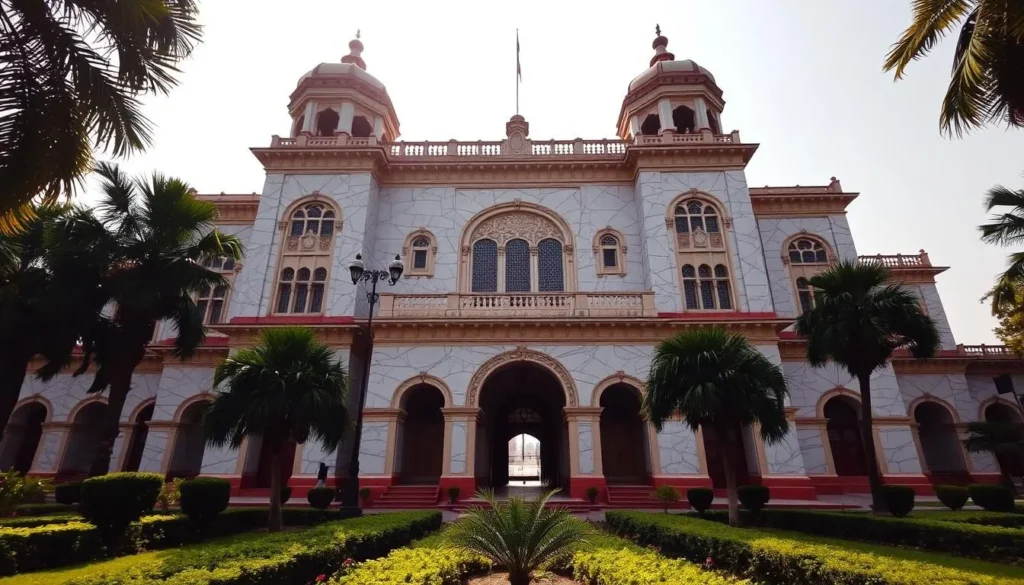
Hemu’s Samadhi Sthal
Hemu’s Samadhi Sthal is a memorial dedicated to King Hemu (Hemchandra Vikramaditya), who briefly held the Delhi throne before being defeated in the Second Battle of Panipat. You can read the informational plaques at Hemu’s memorial that detail his remarkable rise from a humble background to becoming a powerful ruler and his ultimate fall in battle against Akbar’s forces.
| Historical Site | Description |
|---|---|
| Panipat Museum | Exhibits on the three major battles of Panipat and cultural heritage |
| Hemu’s Samadhi Sthal | Memorial dedicated to King Hemu, detailing his rise and fall |
Experience Panipat’s Textile Heritage
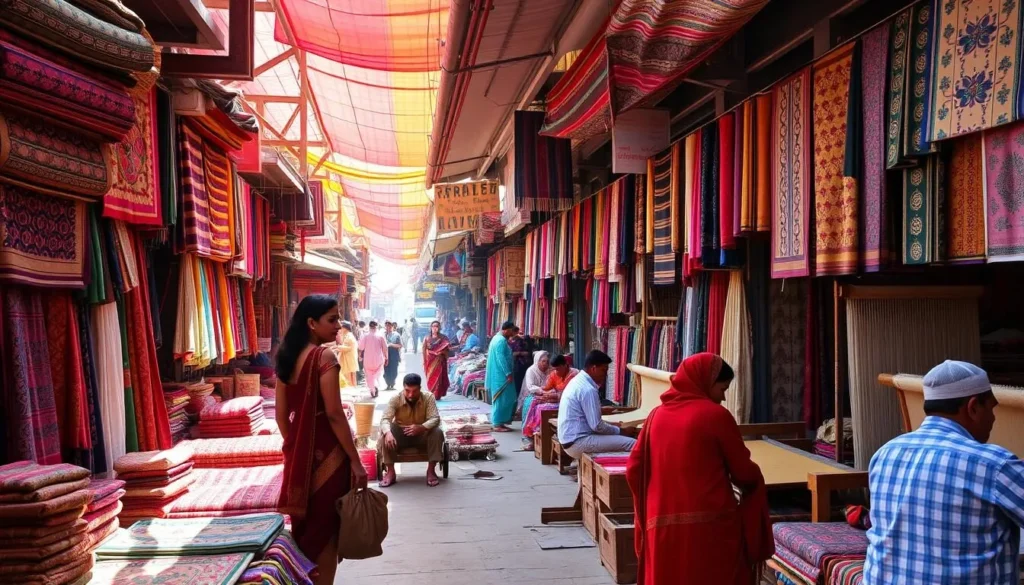
Panipat, known as the “City of Weavers,” offers a unique opportunity to explore its rich textile heritage. You can witness firsthand the intricate processes involved in creating Panipat’s famous textiles, from raw material to finished product.
Panipat Textile Hub
The Panipat Textile Hub is a thriving industry that produces high-quality carpets, durries, bed linens, and home furnishings exported worldwide. You can take guided tours of textile factories and production units, and shop for authentic, factory-direct textiles at prices much lower than retail, making Panipat a great place for home décor enthusiasts.
Panipat Handloom Museum
At the Panipat Handloom Museum, you can learn about the evolution of the city’s textile traditions through exhibits showcasing traditional weaving techniques, tools, and finished products. The museum’s collection of traditional handwoven textiles tells stories of human craftsmanship and cultural significance spanning generations, giving insight into the city’s culture and history.
By exploring Panipat’s textile heritage, you’ll understand how the textile industry has shaped the city’s economy and provided livelihoods for thousands of skilled artisans and workers, becoming an integral part of life in Panipat. You’ll appreciate the blend of traditional craftsmanship and modern manufacturing techniques that have allowed Panipat to maintain its textile heritage while adapting to global market demands, making it a wonderful place to visit for those interested in textiles and home decor.
Outdoor Activities and Recreational Spots
You can enjoy a variety of recreational activities in Panipat’s modern parks and water parks. The city offers a mix of leisure and adventure, making it a great place to visit for families and outdoor enthusiasts alike.

Tau Devi Lal Bio Diversity Park
Tau Devi Lal Bio Diversity Park is a great place to take a leisurely stroll or engage in various recreational activities. It’s a popular spot for families and couples who can run, picnic, or practice yoga amidst nature.
The park is known for its leisure activities rather than historical significance, offering a refreshing escape from Panipat’s historical intensity. You can enjoy jogging tracks, yoga spaces, and children’s play areas, making it an ideal destination for outdoor relaxation.
Kingland Water World
Kingland Water World is another exciting place to visit, especially during summer months. The water park features exciting water slides, wave pools, and splash zones designed for visitors of all ages, providing a fun way to cool off.
The clean facilities and designated group gathering spaces at Kingland Water World make it perfect for family outings, friend reunions, or corporate team-building events, enhancing the overall quality of life in Panipat.
Culinary Experiences and Shopping in Panipat

When visiting Panipat, you can indulge in a diverse range of culinary delights that reflect the city’s cultural heritage. The city offers a unique blend of traditional Haryanvi cuisine and global flavors, making it a great destination for food lovers.
Local Cuisine and Restaurants
Panipat’s culinary landscape is characterized by its rich cultural heritage, with restaurants like Cafe Grillz offering a wide variety of dishes, from local specialties to Mexican, Western, and Middle Eastern cuisine. You can try local Haryanvi specialties like Kachri ki Sabzi, Bajre ki Khichdi, and Meethe Chawal, which reflect the agricultural heritage and culinary traditions of the region. Visiting during festivals like Navratri at the Devi Temple or the Urs festival at Bu Ali Shah Qalandar Dargah provides an opportunity to experience special seasonal foods and sweets.
Panipat Haat and Shopping Areas
For a shopping experience, you can explore Panipat Haat, a vibrant marketplace where you can shop for traditional handicrafts, textiles, and souvenirs while interacting directly with local artisans and craftsmen. Additionally, browsing through the textile shops and factory outlets across Panipat allows you to purchase high-quality handloom products, carpets, and home furnishings at competitive prices directly from manufacturers. You can also sample local street food at the food courts in Panipat Haat and other market areas, tasting authentic flavors in a lively atmosphere surrounded by locals.
Conclusion: Making the Most of Your Visit to Panipat
With its ancient battlefields and vibrant cultural heritage, Panipat is a destination that promises an unforgettable experience. To make the most of your visit, plan your trip between October and March when the weather is pleasant, allowing you to comfortably explore outdoor historical sites like the Battle of Panipat memorials and monuments.
Balance your itinerary with historical exploration, cultural experiences, and recreational activities. Consider hiring a local guide to gain deeper insights into the historical significance of sites like the First Battle of Panipat memorial. Don’t forget to respect local customs and support local artisans by purchasing authentic handloom products to take home.
—
The above is subject to change.
Check back often to TRAVEL.COM for the latest travel tips and deals.
